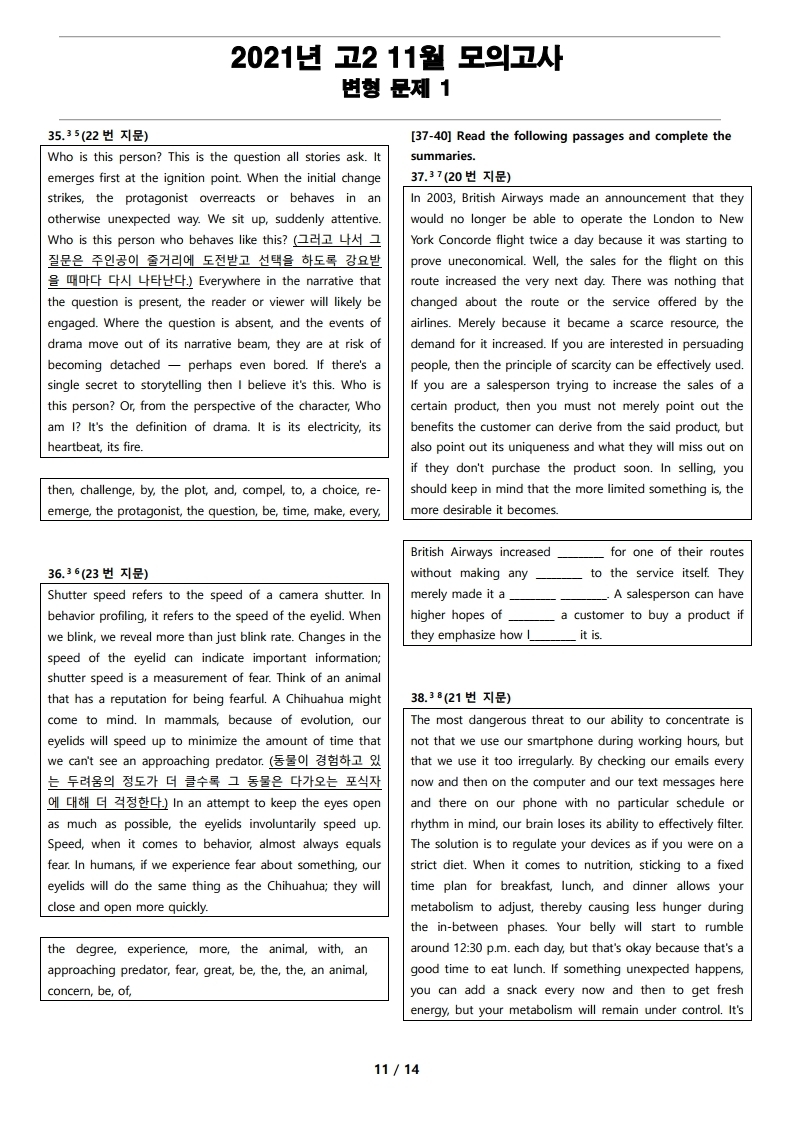2021년 고2 11월 전국 연합 모의고사
(경기도교육청)
변형 문제 1
2021년 고2 11월 전국 연합 모의고사 변형 문제 1
출판사에서 오랫동안 영어 번역과 교정을 하셨던 원어민 선생님과
현직에서 강사를 하고 있는 연구진들이 학생들을 위한 최상의
2021년 고2 11월 전국 연합 모의고사 변형 문제 1 을 선보입니다.
사고력과 이해력을 요구하는 문제들로 내신 대비 뿐만이 아니라
수능도 한꺼번에 공부하실 수 있는 자료입니다.
중간고사&기말고사 전에 더메이킹스(The Makings)에서 제작한
2021년 고2 11월 전국 연합 모의고사 변형 문제로 마무리 하세요.
정답 확인하러가기!
2021년 고2 11월 전국 연합 모의고사 변형 문제(경기도교육청)
2021년 고2 11월 전국 연합 모의고사 변형 문제, 내신대비, 영어내신자료,고등영어자료, 모의고사 변형문제,전국 연합모의고사 변형자료, 모의고사 영어 서술형 대비, 대치동 고등 영어자료, 대치
themakings.co.kr
themakings.co.kr
The Makings의 2021년 고2 11월 전국 연합 모의고사 변형 문제는
총 11개의 유형으로 구성되어 있습니다.
1. 빈칸 채우기(객관식)
2. 글의 내용 일치/불일치(객관식/한글 선택지)
3. 글의 내용 일치/불일치(객관식/영어 선택지)
4. 글 끼어 넣기(객관식)
5. 어법(서술형)
6. 어휘(서술형)
7. 주제문(객관식/영어 선택지)
8. 어휘 빈칸 채우기(서술형)
9. 영작(서술형)
10. 요약문 완성하기(서술형)
11. 문단 재배열 하기(객관식)
더메이킹스(The Makings)가 제작한 2021년 고2 11월 전국 연합 모의고사 변형 문제 1의 지문입니다.
1번 지문(문항 번호 20번)
In 2003, British Airways made an announcement that they would no longer be able to operate the London to New York Concorde flight twice a day because it was starting to prove uneconomical. Well, the sales for the flight on this route increased the very next day. There was nothing that changed about the route or the service offered by the airlines. Merely because it became a scarce resource, the demand for it increased. If you are interested in persuading people, then the principle of scarcity can be effectively used. If you are a salesperson trying to increase the sales of a certain product, then you must not merely point out the benefits the customer can derive from the said product, but also point out its uniqueness and what they will miss out on if they don't purchase the product soon. In selling, you should keep in mind that the more limited something is, the more desirable it becomes.
2번 지문(문항 번호 21번)
The most dangerous threat to our ability to concentrate is not that we use our smartphone during working hours, but that we use it too irregularly. By checking our emails every now and then on the computer and our text messages here and there on our phone with no particular schedule or rhythm in mind, our brain loses its ability to effectively filter. The solution is to regulate your devices as if you were on a strict diet. When it comes to nutrition, sticking to a fixed time plan for breakfast, lunch, and dinner allows your metabolism to adjust, thereby causing less hunger during the in-between phases. Your belly will start to rumble around 12:30 p.m. each day, but that's okay because that's a good time to eat lunch. If something unexpected happens, you can add a snack every now and then to get fresh energy, but your metabolism will remain under control. It's the same with our brain when you put it on a "media diet."
3번 지문(문항 번호 22번)
Who is this person? This is the question all stories ask. It emerges first at the ignition point. When the initial change strikes, the protagonist overreacts or behaves in an otherwise unexpected way. We sit up, suddenly attentive. Who is this person who behaves like this? The question then re-emerges every time the protagonist is challenged by the plot and compelled to make a choice. Everywhere in the narrative that the question is present, the reader or viewer will likely be engaged. Where the question is absent, and the events of drama move out of its narrative beam, they are at risk of becoming detached ― perhaps even bored. If there's a single secret to storytelling then I believe it's this. Who is this person? Or, from the perspective of the character, Who am I? It's the definition of drama. It is its electricity, its heartbeat, its fire.
4번 지문(문항 번호 23번)
Shutter speed refers to the speed of a camera shutter. In behavior profiling, it refers to the speed of the eyelid. When we blink, we reveal more than just blink rate. Changes in the speed of the eyelid can indicate important information; shutter speed is a measurement of fear. Think of an animal that has a reputation for being fearful. A Chihuahua might come to mind. In mammals, because of evolution, our eyelids will speed up to minimize the amount of time that we can't see an approaching predator. The greater the degree of fear an animal is experiencing, the more the animal is concerned with an approaching predator. In an attempt to keep the eyes open as much as possible, the eyelids involuntarily speed up. Speed, when it comes to behavior, almost always equals fear. In humans, if we experience fear about something, our eyelids will do the same thing as the Chihuahua; they will close and open more quickly.
'전국 연합 모의고사 변형 문제 > 고2 모의고사 변형 문제' 카테고리의 다른 글
| 2021년 고2 11월 전국 연합 모의고사(경기도교육청) 변형 문제 3 (0) | 2021.12.08 |
|---|---|
| 2021년 고2 11월 전국 연합 모의고사(경기도교육청) 변형 문제2 (0) | 2021.12.06 |
| 2021년 고2 9월 전국 연합 모의고사(인천시) 변형 문제 4 (0) | 2021.09.15 |
| 2021년 고2 9월 전국 연합 모의고사(인천시) 변형 문제 3 (0) | 2021.09.12 |
| 2021년 고2 9월 전국 연합 모의고사(인천시)변형 문제 2 (0) | 2021.09.11 |

